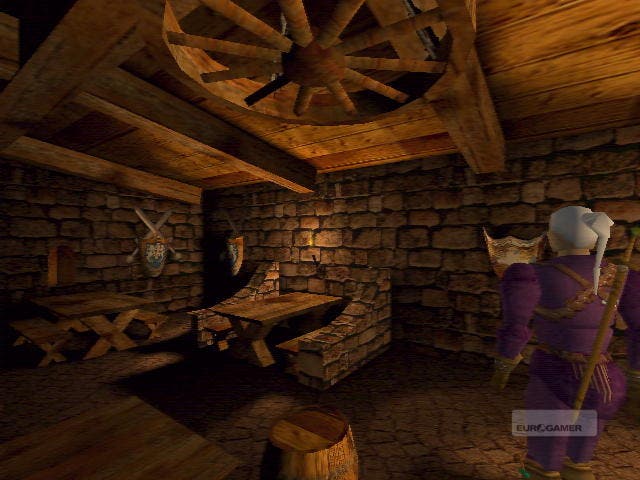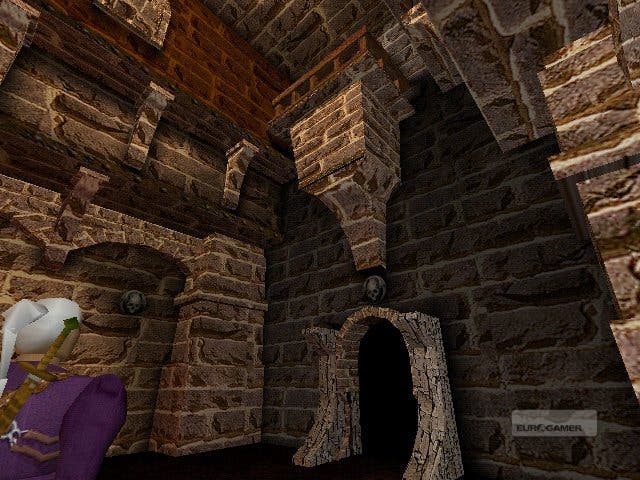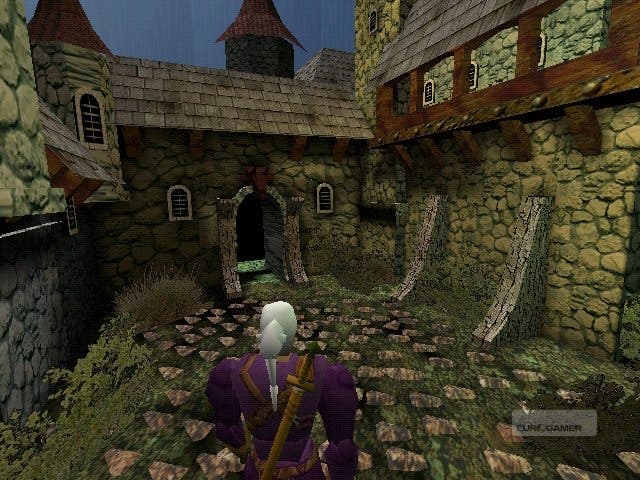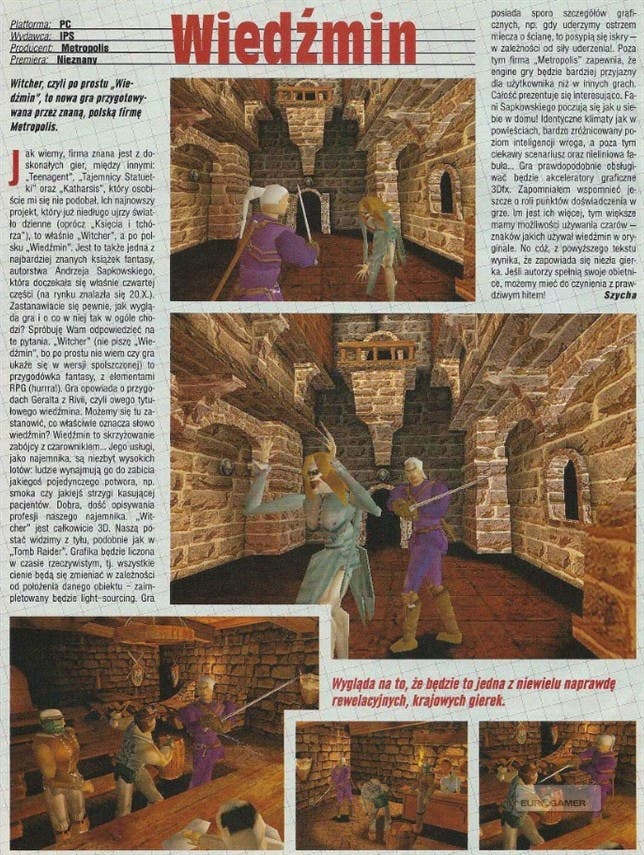The Witcher game that never was
Made in Poland but not by CD Projekt Red.
The Witcher 3 is out today, and so we've hauled another exciting Witcher-related article out of the Eurogamer archive for you to read again or enjoy for the first time if you missed it. Here, Robert Purchese reveals the story of the Witcher game that never was in an article first published in June 2014.
In all the hubbub at E3 surrounding The Witcher 3 - many people's game of the show - it was surprising for me to discover that there was another Witcher game, a long time ago, that I had no idea existed. It wasn't made by CD Projekt Red - in fact it didn't have anything to do with CD Projekt - but it was being made in Poland.
It was being made by Adrian Chmielarz, the developer best known for leading People Can Fly and Bulletstorm [and now the excellent Vanishing of Ethan Carter]. Long before the PCF days he worked at another studio that he co-founded with a school friend - a studio called Metropolis. And it's here that in 1996 and 1997 - six years before developer CD Projekt Red was founded - a game called The Witcher was being made.

Like many people in Poland, Chmielarz loved the short "Wiedźmin" stories written by a man I've heard described as Poland's Tolkien, Andrzej Sapkowski. And Chmielarz knew him. He'd met him at sci-fi conventions throughout the '80s and '90s - places where the strict Polish rule of addressing strangers as "Mr" or "Mrs" wasn't welcome. At conventions you addressed people as "you" - a friendly term. It was a big deal, Chmielarz assures me. It meant you could stand face to face with your literary idol and talk like friends. "So I just knew Sapkowski," he almost shrugs, and he wanted to use the Wiedźmin fantasy for a game.
"I just wrote him a letter and told him we wanted to do it," he says, as if it were the most straightforward thing in the world. "And he agreed." Chmielarz kept copies of the letters he sent confirming this, which apparently show him - not CD Projekt - as the person responsible for coining the translation 'The Witcher'. Before that there was no English word for Wiedźmin. "I don't want to sound like 'heyyyy, I'm that guy'," Chmielarz says. "All I know is that at least he claimed that I was the one who proposed the title."
Money changed hands - "good money for Poland in 1997", "ridiculous" by any other standards - and the licence was signed. Sapkowski took the money and kept to himself, which was something Chmielarz at first interpreted as 'giving space', and then - after a number of unanswered letters (Sapkowski didn't do email) - as 'he doesn't give a s***'.
"Honestly, at that time, he just didn't care about games at all. I think he thought something like this: 'Extra money is coming my way. Nobody cares about games so it's not going to destroy my character in any way. Yeah, let's do it.' All it was was extra money to him which is fine - totally fine! I don't blame him. That's actually pretty smart." After all, he got his money regardless of whether the game appeared. And it didn't.

It was going to be an action-adventure game, Chmielarz's Witcher, with moral choices, mature storytelling and psychologically complex characters. "The focus was on making it this 3D action-adventure that was, as we called it at the time - and again I hate to use this term because it sounds pretentious - for adults.
"I know it sounds a little cliché or funny in 2014, but in 1997 - 17 years ago - it wasn't really obvious. These things like moral choices or hard choices or slightly darker storytelling - it wasn't common. But that was the goal and it was all because of the quality of the source material - it inspired us to do something very special."
While his Witcher wasn't supposed to be a role-playing game - the style made famous by CD Projekt Red - it was going to have some RPG elements. "It would follow a linear story but within that you would have your choices - small branches, if you will. You would have powers and you could upgrade them, and you could collect XP points. So there was this slight RPG element to it. But the focus was on making it this action adventure."
Visuals were important and Metropolis made strides by ditching the preset scenes of the time for dynamic 3D environments. "It was actually quite impressive for the time," Chmielarz says. "We even actually had a working prototype of the game, the first chapter." But sadly all that work is now lost, because, "As it turns out, CDs actually don't hold all your data for 100 years!" He tried recovering the data a few years ago but quickly realised that "forget it: they're dead".
All that remains of Metropolis' Witcher today are the screenshots you see in this article, some Polish documents and those letters sent to Sapkowski.

The Witcher didn't work out at Metropolis because the studio had bitten off more than it could chew. Founded in 1992, the studio was flush with the early successes of Polish point-and-click The Mystery of the Statuette, and shareware point-and-click Teenagent. So it took on the ambitious Witcher project... while at the same time as taking on three other games: Catharsis, a shoot-'em-up; Gorky 17, an RPG strategy game; and Human Blood, a beat-'em-up. "It was silly, simply," says Chmielarz, especially as there were only around 15 people working there.
The Witcher got as far as signing a publisher, TopWare, and releasing screenshots to press, but technical issues and doubts on the publisher's behalf created a hurdle too high to leap, and it sounds as though Chmielarz had second thoughts about the The Witcher's international appeal - as a game based on Slavic mythology - too.
"There wasn't any drama," he says, but no one fought for The Witcher and "it just kind of died".
The project was resurrected "a year or so later", and a playable version of the first chapter was made. "However, the main game we were making at the time, Gorky 17, was behind," so the team was re-purposed, and what was supposed to take a few months took nine. The Witcher was forgotten. Adrian Chmielarz left Metropolis in 1999, and "with each passing year The Witcher gathered more and more dust until it became clear it was never going to happen".
But it was never formally cancelled, which meant, in theory, Metropolis could have upset CD Projekt's plan by refusing to sell the IP or asking too high a price. "But that was never really... We just joked about it," Chmielarz says. "That was never really something we seriously considered."
There's a Polish proverb about a 'Gardener's dog' that won't eat its master's produce but won't let anyone else either, he tells me. And he didn't want to be that. "We f***ed up, basically, so good luck and have fun."
CD Projekt would swoop to acquire The Witcher in around 2002; CD Projekt would swoop again in 2009 to acquire Metropolis - the studio it needed to engineer its life-saving reverse takeover bid.

"I'd have to be a robot not to be a little bit jealous of their success," Chmielarz reflects today. It was particularly hard when CD Projekt Red overtook People Can Fly as the most notable developer in Poland, he says, but he's not bitter. "I'm really happy that it turned out this way."
On a professional level he's happy where he's at: leading The Astronauts making The Vanishing of Ethan Carter. And on a personal level he's happy that CD Projekt Red is making games he adores. "These guys gave me some of the best gaming memories ever with the second act of The Witcher 2," he says. Metropolis would have retold the stories Sapkowski had written; CD Projekt Red tells its own, based on Sapkowski's works.
But what if? What if Metropolis had run with The Witcher series and CD Projekt hadn't? Well, Chmielarz mulls, then CD Projekt Red probably wouldn't exist. "For me it doesn't matter that we didn't make The Witcher at Metropolis, but for CD Projekt it matters that they took this brand and turned it into gold.
"It's almost a good thing that we didn't do it."
With The Witcher 3, CD Projekt Red has a chance to crown a decade of work and the first part of its history - its becoming. What 150 people there are making - and they have a lot left to do - will feel, Chmielarz believes, like the work of a thousand. And if CD Projekt Red delivers what he expects the studio to, then "they enter the Premiership for good".

